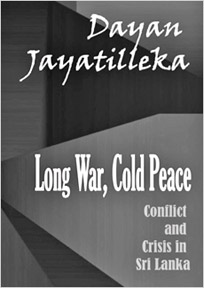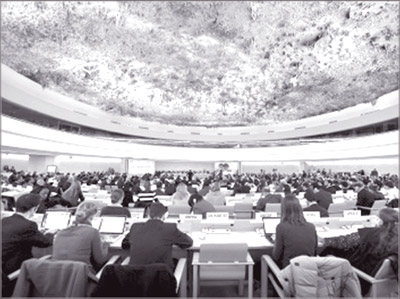|
RIGHT OF REPLY:
SRI LANKA IN GENEVA: THE DEVOLUTION/ ACCOUNTABILITY TRADE-OFF
DR DAYAN JAYATILLEKA
My friend HLD Mahindapala is writing a book length diatribe on my
latest book, Long War, Cold Peace (Vijitha Yapa, 2013). I have chosen
not to respond as entering his discourse as contained and represented in
his extended review, would be the intellectual equivalent of entering a
Taliban held area of remote Afghanistan. However, in the public interest
as well as in fairness to myself I have to set the record straight on
his latest effusion which is a grotesque distortion of Sri Lanka at the
UNHRC in Geneva in 2009, and my own role there.
 What HLD Mahindapala fails to grasp is that Sri Lanka made a
trade-off in Geneva in 2009: devolution for accountability. In so doing
we bought ourselves three years of time and space. How the Sri Lankan
authorities used that time and space is another question. The main
threat was and still is one of an independent international inquiry on
accountability for actions allegedly committed during the last stages of
the war. The target was and is not only our country’s present leadership
but its Armed Forces. We in Geneva at the time, set out to protect our
Armed Forces and the moral legitimacy of our victory. I am proud of
having played my part. What HLD Mahindapala fails to grasp is that Sri Lanka made a
trade-off in Geneva in 2009: devolution for accountability. In so doing
we bought ourselves three years of time and space. How the Sri Lankan
authorities used that time and space is another question. The main
threat was and still is one of an independent international inquiry on
accountability for actions allegedly committed during the last stages of
the war. The target was and is not only our country’s present leadership
but its Armed Forces. We in Geneva at the time, set out to protect our
Armed Forces and the moral legitimacy of our victory. I am proud of
having played my part.
As for the strategy, tactics and dynamics of May 2009 and my own role
in Geneva, it is best not to be detained either by my protestations or
Mr Mahindapala’s strange indictment and look instead to more
authoritative and independent sources.
The Economist (London) described by Karl Marx as “the most
intelligent defender of capitalism” referred to in its August 6-8 , 2009
issue to “...Dayan Jayatilleka, Sri Lanka’s Ambassador to Geneva, who
warded off the threatened UN war-crimes probe in May (2009)...”
Thanks to Wikileaks what is now known is that US Secretary of State
instructed its Mission in Geneva to throw its weight behind the move on
Sri Lanka at the UNHRC Special Sessions in 2009.
“Mission Geneva is requested to convey to the Czech Republic and
other like-minded members of the HRC that the USG supports a special
session on the human rights situation in Sri Lanka and related aspects
of the humanitarian situation. Mission is further requested to provide
assistance, as needed, to the Czech Republic in obtaining others,
signatures to support holding this session…Mission is also instructed to
engage with HRC members to negotiate a resolution as an outcome of this
special session, if held.
Department believes a special session that does not result in a
resolution would be hailed as a victory by the Government of Sri Lanka.
Instructions for line edits to the resolution will be provided by
Department upon review of a draft.” [Cable dated May 4, 2009 from
Secretary of State (United States)]
Diplomatic approach
Wikileaks shows that as early as September 2007, just two months
after I had taken over as Ambassador/PRUN, the Western Group, led by the
UK, was revising and reactivating a resolution that had been hanging
over Sri Lanka in the previous year, 2006 – a danger and challenge which
I had inherited.
“….a UK Mission contact told us that work is only at an early stage
on the text of a possible resolution, which would update one that the EU
put forward in last year’s Council session.” [Cable dated September 10,
2007]
A US Mission cable described the effect of our strategy as follows:
“… There was general agreement that Sri Lanka, and in particular its
outspoken ambassador here, were effectively playing off the West against
less developed countries.”[Cable date March 10, 2008]
|

UNHRC meeting in Geneva |
A considerably important cable conveys the assessment made to Susan
Rice, until a few days ago the Cabinet-ranked US Ambassador/Permanent
Representative in the Security Council, by Human Rights High
Commissioner Navi Pillay, on the results of the Special Session on Sri
Lanka. The assessment was that “Sri Lanka and its allies, meanwhile, had
a draft resolution ready to go and simply outmanoeuvred the EU.” [Cable
date 25 June 2009]
This is not a one-off assessment. The Wikileaks cables report a
conversation in Paris, significantly between the US Ambassador-at-large
for War Crimes Issues, Clint Williamson, and senior officials of the
French Foreign Ministry (widely respected as the fount of modern
European diplomatic tradition and practice). A cable from the US Embassy
in Paris to Washington DC quotes France’s Official Representative for
International Penal Tribunals, Christian Bernier, as saying that Sri
Lanka was “very effective in its diplomatic approach in Geneva”:
“Bernier opined that the Sri Lankan government is “very effective” in
its diplomatic approach in Geneva and said France is in an
information-collection phase to obtain a more effective result in the
HRC”. [Cable dated July 16, 2009]
Outside of purely partisan ethnic propaganda, the most serious
negative account of Sri Lanka’s war and the conduct of the Sri Lankan
state is the solidly researched, well written, intelligent and readable
book, The Cage by Gordon Weiss. It contains an entire chapter, 30 pages
long, on the international and diplomatic dimension of the conflict’s
closing stages (Ch 9: The Watching World).
The UN Geneva is brought to life in Weiss’ volume: “On May 27 at the
Palais des nations in Geneva, the UN High Commissioner for Human Rights,
Navanetham Pillay, addressed the Human Rights Council and called for an
international inquiry into the conduct of both parties to the war. While
the EU and a brace of other countries formulated and then moved a
resolution in support of Pillay’s call, a majority of countries on the
council rejected it out of hand. Instead they adopted an alternative
motion framed by Sri Lanka’s representatives praising the Sri Lankan
government for its victory over the Tigers...” (p229)
UNHRC
In his concluding chapter Weiss describes my role: “Dayan
Jayatilleka, one of the most capable diplomats appointed by the
Rajapaksa regime, had outmanoeuvred Western diplomats to help Sri Lanka
escape censure from the UN Human Rights Council in Geneva.
He had also been one of the most trenchant advocates within the
government for meaningful constitutional reform, including the
devolution of power to the provinces (p256-7)”. In his Notes he makes
this evaluation: “Jayatilleka was the most lucid of the vocal Government
of Sri Lanka representatives...” (p 330)
Research scholar David Lewis presented a paper at the University of
Edinburgh, entitled ‘The failure of a liberal peace: Sri Lanka’s
counterinsurgency in global perspective’, and published in Conflict,
Security and Development, 2010, Vol 10:5, pp 647-671. Lewis is Senior
Research Fellow at the Centre for International Co-operation and
Security in the Department of Peace Studies, University of Bradford, and
headed the International Crisis Group’s Sri Lanka programme in 2006-7.
In the study, he writes:
“Many of the battles over conflict-related norms between Sri Lanka
and Europe took place in UN institutions, primarily the Human Rights
Council (HRC)…it was Sri Lanka which generally had the best of these
diplomatic battles...”
“Although this process of contestation reflects shifting power
relations, and the increasing influence of China, Russia and other
‘Rising Powers’, it does not mean that small states are simply the
passive recipients of norms created and contested by others. In fact,
Sri Lankan diplomats have been active norm entrepreneurs in their own
right, making significant efforts to develop alternative norms of
conflict management, linking for example Chechnya and Sri Lanka in a
discourse of state-centric peace enforcement. They have played a leading
role in UN forums such as the UN HRC, where Sri Lankan delegates have
helped ensure that the HRC has become an arena, not so much for the
promotion of the liberal norms around which it was designed, but as a
space in which such norms are contested, rejected or adapted in
unexpected ways...”
“As a member of the UN HRC Sri Lanka has played an important role in
asserting new, adapted norms opposing both secession and autonomy as
possible elements in peace-building—trends that are convergent with
views expressed by China, Russia and India…”
(Lewis: 2010, pp. 658-661)
So there we have it; that’s the story as seen by critical
observer-analysts. It is entirely at variance with HLD Mahindapala’s
grotesque version. We were defeated in Geneva in 2012 and 2013 and are
on the defensive internationally because we did not fulfil our part of
the devolution for accountability strategic trade-off. The more we
retreat or delay on devolution, the more our critics advance on the
all-important and dangerous front of accountability. The Tamil Eelamist
Diaspora networks do not care about devolution; they scorn the 13th
Amendment. They are focused on accountability. So are Susan Rice, the
incoming National Security Advisor to President Obama, and Samantha
Power, the Ambassador/Permanent Representative designate of the USA to
the UN Security Council. India however, still focuses more on the 13th
amendment. Can we fight on both fronts? Should we try? Which is the
lesser danger and what is the more prudent compromise?
Navanetham Pillay
UNHRC meeting in Geneva
|





